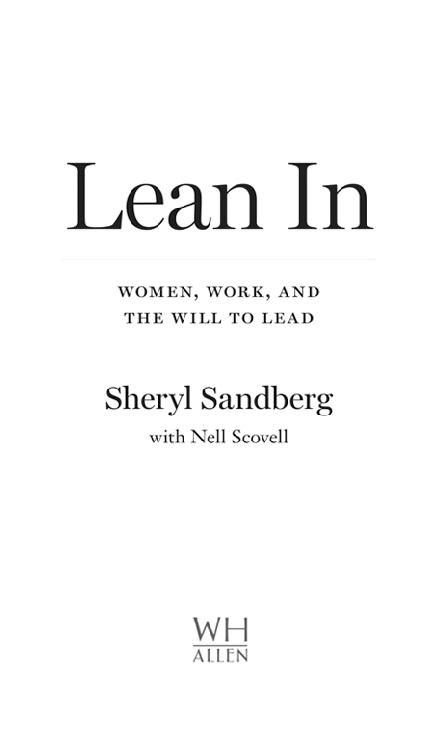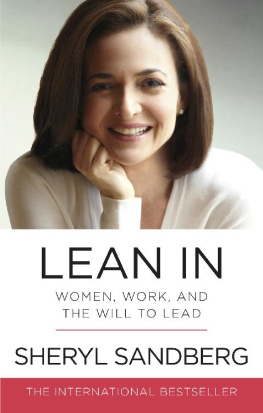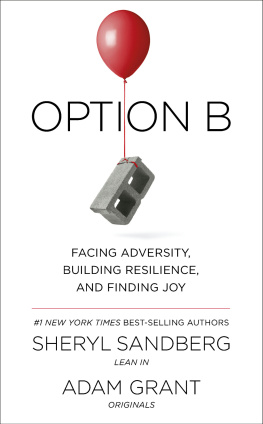Contents
About the Book
In many parts of the world, women are better off today than ever before, with increased opportunities and the promise of equality. Yet despite all the progress women have made, men still hold the vast majority of leadership positions in government and industry, and women are still not heard equally in the decisions that most affect our lives. In Lean In , Sheryl Sandberg examines why womens progress in achieving leadership roles has stalled, explains the root causes, and offers solutions that can empower women to achieve their full potential.
In 2010, Sandberg, chief operating officer of Facebook, gave an electrifying TEDTalk viewed more than 2 million times. In it she described how women unintentionally hold themselves back in their careers, and encouraged women to sit at the table, take risks, and pursue their goals with gusto.
Sandberg digs deeper into these issues in Lean In , combining personal anecdotes, hard data, and compelling research to cut through the layers of ambiguity and bias surrounding the lives and choices of working women. She describes specific, practical steps women can take to combine professional achievement with personal fulfilment and demonstrates how men can benefit by supporting women in the workplace and at home.
Written with both humour and wisdom, Sandbergs book is an inspiring call to action and a blueprint for individual growth. Lean In is destined to change the conversation from what women cant do to what they can.
About the Author
SHERYL SANDBERG is chief operating officer at Facebook. Prior to working at Facebook, she was vice president of Global Online Sales and Operations at Google, and chief of staff at the United States Treasury Department. Before that, she worked as a consultant at McKinsey & Company and as a research assistant at the World Bank. Sheryl serves on the boards of Facebook, The Walt Disney Company, Women for Women International, V-Day, and ONE, and chairs the board of Lean In. She received a BA in economics from Harvard University and an MBA from the Harvard Business School. Sheryl lives in Northern California with her husband, Dave Goldberg, and their two children.
TO MY PARENTS
for raising me to believe that
anything was possible
AND TO MY HUSBAND
for making everything possible
INTRODUCTION
Internalizing the Revolution
I GOT PREGNANT with my first child in the summer of 2004. At the time, I was running the online sales and operations groups at Google. I had joined the company three and a half years earlier when it was an obscure start-up with a few hundred employees in a run-down office building. By my first trimester, Google had grown into a company of thousands and moved into a multibuilding campus.
My pregnancy was not easy. The typical morning sickness that often accompanies the first trimester affected me every day for nine long months. I gained almost seventy pounds, and my feet swelled two entire shoe sizes, turning into odd-shaped lumps I could see only when they were propped up on a coffee table. A particularly sensitive Google engineer announced that Project Whale was named after me.
One day, after a rough morning spent staring at the bottom of the toilet, I had to rush to make an important client meeting. Google was growing so quickly that parking was an ongoing problem, and the only spot I could find was quite far away. I sprinted across the parking lot, which in reality meant lumbering a bit more quickly than my absurdly slow pregnancy crawl. This only made my nausea worse, and I arrived at the meeting praying that a sales pitch was the only thing that would come out of my mouth. That night, I recounted these troubles to my husband, Dave. He pointed out that Yahoo, where he worked at the time, had designated parking for expectant mothers at the front of each building.
The next day, I marched inor more like waddled into see Google founders Larry Page and Sergey Brin in their office, which was really just a large room with toys and gadgets strewn all over the floor. I found Sergey in a yoga position in the corner and announced that we needed pregnancy parking, preferably sooner rather than later. He looked up at me and agreed immediately, noting that he had never thought about it before.
To this day, Im embarrassed that I didnt realize that pregnant women needed reserved parking until I experienced my own aching feet. As one of Googles most senior women, didnt I have a special responsibility to think of this? But like Sergey, it had never occurred to me. The other pregnant women must have suffered in silence, not wanting to ask for special treatment. Or maybe they lacked the confidence or seniority to demand that the problem be fixed. Having one pregnant woman at the topeven one who looked like a whalemade the difference.
Today in the United States, the United Kingdom, and the developed world, women are better off than ever. We stand on the shoulders of the women who came before us, women who had to fight for the rights that we now take for granted. In 1947, Anita Summers, the mother of my longtime mentor Larry Summers, was hired as an economist by the Standard Oil Company. When she accepted the job, her new boss said to her, I am so glad to have you. I figure I am getting the same brains for less money. Her reaction to this was to feel flattered. It was a huge compliment to be told that she had the same brains as a man. It would have been unthinkable for her to ask for equal compensation.
We feel even more grateful when we compare our lives to those of other women around the world. There are still countries that deny women basic civil rights. Worldwide, about 4.4 million women and girls are trapped in the sex trade. We are centuries ahead of the unacceptable treatment of women in these countries.
But knowing that things could be worse should not stop us from trying to make them better. When the suffragettes marched in the streets, they envisioned a world where men and women would be truly equal. A century later, we are still squinting, trying to bring that vision into focus.
The blunt truth is that men still run the world. This means that when it comes to making the decisions that most affect us all, womens voices are not heard equally. Of the 195 independent countries in the world, only 17 are led by women. None of these figures are close to 50 percent.
The percentage of women in leadership roles is even lower in the corporate world. A meager 4 percent of the Fortune 500 CEOs are women.
Progress remains equally sluggish when it comes to compensation. In 1970, American women were paid 59 cents for every dollar their male counterparts made. By 2010, women had protested, fought, and worked their butts off to raise that compensation to 77 cents for every dollar men made.
I have watched these disheartening events from a front-row seat. I graduated from college in 1991 and from business school in 1995. In each entry-level job after graduation, my colleagues were a balanced mix of male and female. I saw that the senior leaders were almost entirely male, but I thought that was due to historical discrimination against women. The proverbial glass ceiling had been cracked in almost every industry, and I believed that it was just a matter of time until my generation took our fair share of the leadership roles. But with each passing year, fewer and fewer of my colleagues were women. More and more often, I was the only woman in the room.







